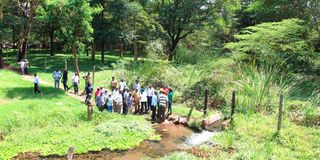Jitters as government moves to reclaim wetlands

A delegation of officials from different governt agencies during a tour of Kiboko wetland in Makueni County on December 19, 2023.
Communities living on Makueni wetlands set to be gazetted are opposing the move, threatening to derail rehabilitation of the crucial catchment areas.
The sustained pushback cast a shadow when a delegation of the Ministry of Lands, National Environmental Management Authority (Nema), Kenya Water Towers Agency, National Lands Commission, Survey of Kenya, Water Resources Authority, Kenya Wildlife Service, Kenya Forest Service and Makueni County government officials toured the wetlands.
Wilfred Musila, a director at Kenya Water Towers Agency, said Kiboko, Kiu, Umani, Kibwezi, Kwa Kyai, Thange, Kambu, Mang’elete, Ngai Ndethya, and Mtitu Andei wetlands are lined up for gazettement.
“We are conducting a reconnaissance study to establish the status of the wetlands within the Chyulu Hills Ecosystem before the gazettement as directed by President William Ruto,” she said after leading the delegation.
The Head of State ordered the gazettement to pave the way for their restoration when he presided over the inaugural National Tree Planting Day at Kiu wetland a month ago. He said that was key in his plan to address food security.
Protected
“We have 10 wetlands in this region but only two are protected. The rest are degraded. We had 23 rivers. Today we have only one river. We have cut down trees, settled on wetlands and cultivated them. That is why we are facing a big problem which is causing food insecurity. We shall resettle the communities living on the wetlands,” he said.
Environment Cabinet Secretary Soipan Tuya has since met Makueni Governor Mutula Kilonzo Junior to thrash out the planned gazettement. The identification of the persons to be affected in the project remains a sticky issue.
A recent meeting called by Nema to profile the communities to be affected by the planned gazettement of Kiu wetland turned into a showdown between the government officials and communities which lay claim to the expansive wetland.
Whereas those holding allotment letters to parcels of land in the wetland are calling on the government to rethink the eviction drive, squatters push to be considered for compensation.
“We have been coexisting with the wetland for years. In fact, we have been conserving it. Instead of the threats of eviction, the government should consider involving us in conserving the wetland,” said Ibrahim Makwata who has called the wetland home for more than 40 years.
The outcry is equally pronounced in Mang’ elete wetland which has been the main source of water, fresh vegetables and livelihoods in Mtito Andei region after it sprang back to life a year ago after drying up for years.
Head of Nema in the Eastern region Marian Kioko appealed for calm, saying the government was determined to strike a balance between rsidents’ concerns and the push for conservation.
The 2000-acre Kiu wetland, which was once the main source of water and fresh vegetables in the area, has been degraded to the chagrin of environmentalists and area leaders.
“When we were growing up, Kiu wetland supported a vibrant horticulture industry in this region. We even used to catch fish here. Farmers exported vegetables. This ended in 2012 when River Makindu which emanated from the wetland dried up completely thanks to over-extraction and degradation of the wetland,” Kibwezi West MP Mwengi Mutuse said.
Aggressive reforestation
Years of concerted efforts to restore the expansive wetland through aggressive reforestation have turned futile thanks to drought and attacks on the seedlings by livestock which roam the wetland. Kenya Forest Service has installed forest guards in the area to protect the newly planted seedlings.
Buoyed by politicians in the region who support the wetlands reclamation drive on condition that the government compensates all the persons affected by the exercise, communities living in the wetlands have threatened to head to court to stop the planned exercise.
“Kwa Malai Village should be struck out of the wetland. It does not meet the legal definition of a wetland according to the Environmental Management and Coordination Act. To access water we sink wells up to 20 feet deep,” said Christine Mumbua, a resident.





